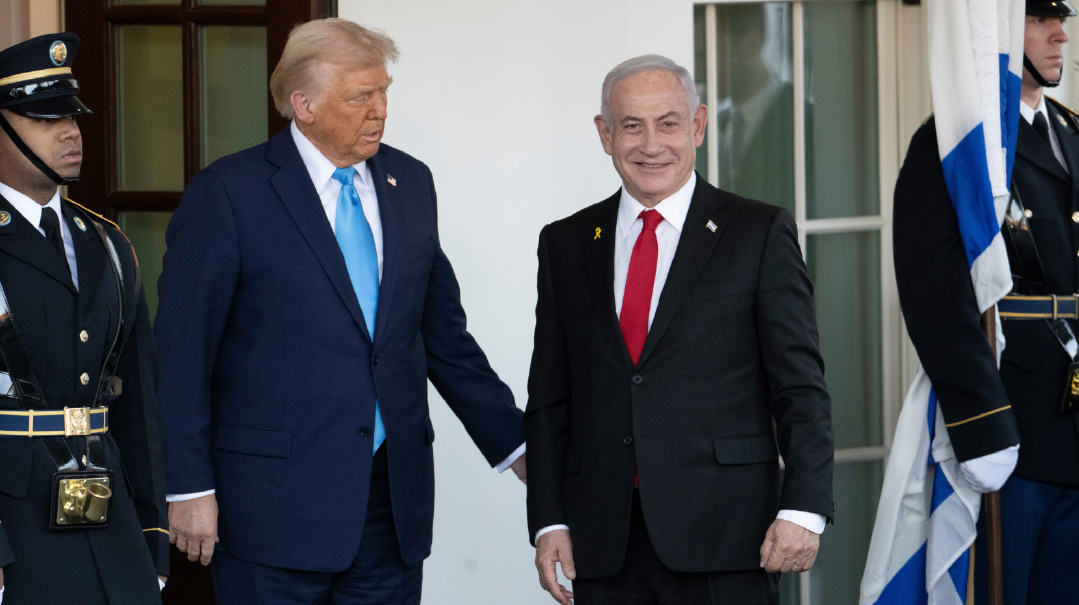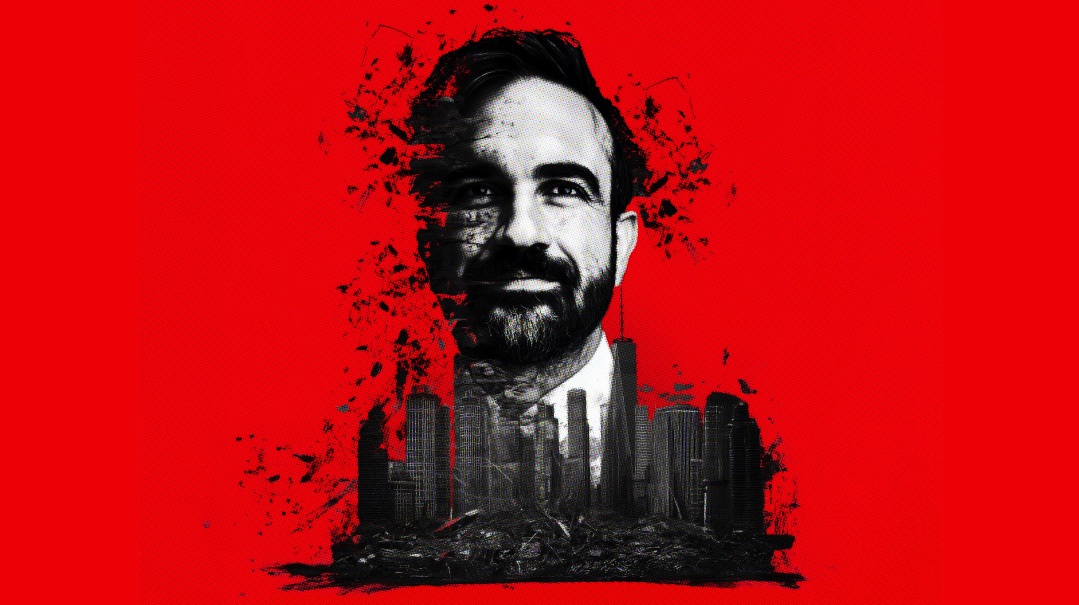British Defender

Colonel Richard Kemp is practically alone as he explains why the IDF is the “world’s most moral army.” But his military expertise makes him hard to silence and too authoritative to ignore
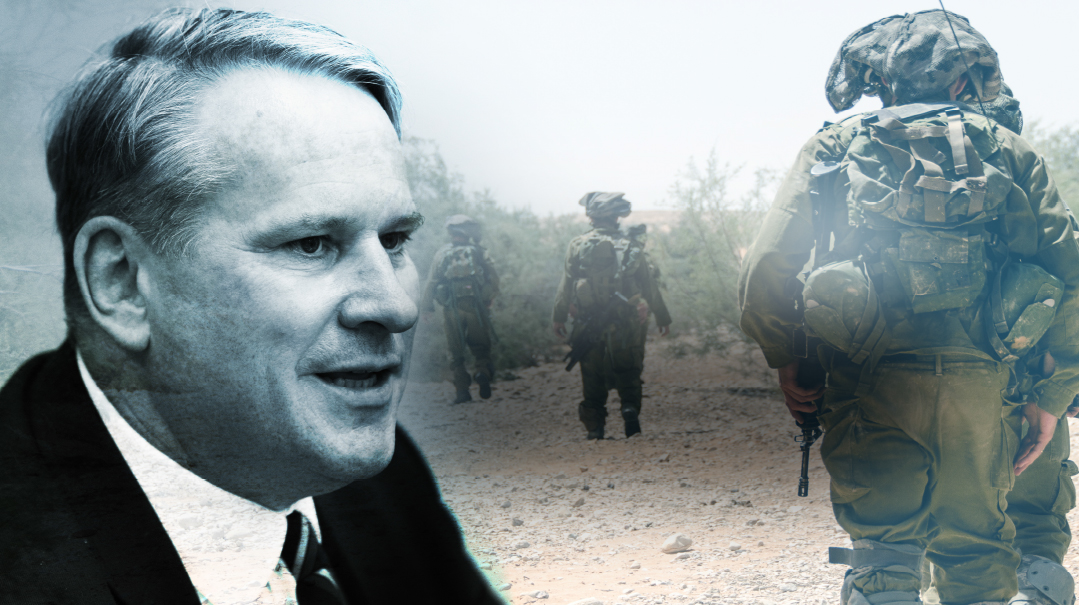
After four wars, endless low-level terror, and countless interviews, Israel’s enemies and friends both already know the routine. As soon as the first Hamas rocket is fired, Colonel Richard Kemp, a former British Army officer, will be doing one of the most difficult jobs today: he’ll be in studios and online defending Israel’s right to protect its citizens. In a British media and political environment often hostile to strongly pro-Israel voices, Kemp is practically alone as he explains why the IDF is the “world’s most moral army.”
Richard Kemp first emerged as a staunch Israel defender in 2009, when he addressed the UN Human Rights Council after the Goldstone Report on that year’s Gaza war. The central conclusion of the UN fact-finding mission led by South African judge Richard Goldstone — that the IDF had committed war crimes by deliberately targeting civilians — was enormously damaging to Israel.
In the political and media storm surrounding the report at the UN, Kemp spoke up in Israel’s defense.
“I am the former commander of the British forces in Afghanistan,” he told discomfited members of the Human Rights Council as a guest of UN Watch, an NGO. “I served with NATO and the United Nations; commanded troops in Northern Ireland, Bosnia, and Macedonia; and participated in the Gulf War. I spent considerable time in Iraq since the 2003 invasion, and worked on international terrorism for the UK Government’s Joint Intelligence Committee.
“Mr. President,” he continued, “based on my knowledge and experience, I can say this: During Operation Cast Lead, the Israeli Defense Forces did more to safeguard the rights of civilians in a combat zone than any other army in the history of warfare.”
More than a decade later, the dynamics haven’t changed: The United Nations still treats Israel as the villain while indulging Hamas terrorism. In the interim, “Colonel Richard Kemp” has become synonymous with a brand of pro-Israel advocacy more typical of the American right.
But even as his views on the Israel-Palestinian conflict put him at odds with his hosts on the BBC and Britain’s Sky News, as a non-Jewish, non-Israeli military expert, Col. Kemp is both hard to silence and too authoritative to ignore.
It’s an unusual route for someone with Richard Kemp’s background to have taken. Born in Colchester, a major garrison town, Kemp knew early on that he wanted to make a career in the military. With no Jewish friends growing up, Israel wasn’t on his radar as he first served lengthy tours in Northern Ireland battling the IRA, then in the Gulf War, followed by a spell commanding British troops in Afghanistan.
About to head to Israel to debrief with IDF officers about the successes and failures of the latest Gaza war, Kemp didn’t spare the superlatives. He shared how he found himself a participant in the media wars; spoke about the harsh realities of fighting in the Middle East; and said why Gaza 2021 could go down as the most impressive precision campaign in military history.
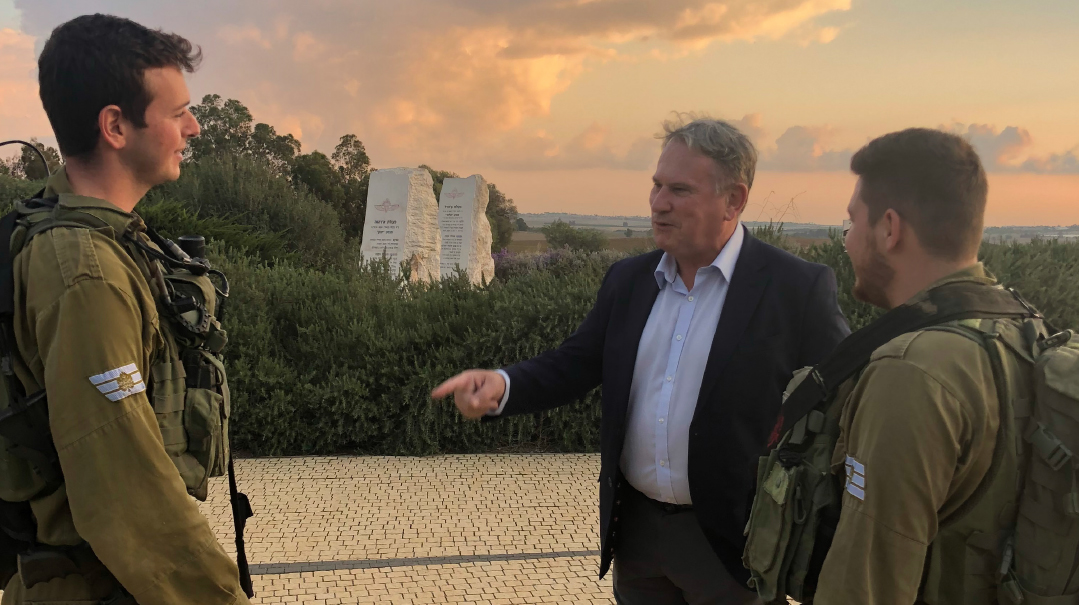
In a country that has one of the world’s biggest media organizations, the BBC, and a dearth of strongly pro-Israel voices, you’re something of a phenomenon. How exactly did Colonel Richard Kemp come to be such a prominent Israel ally?
It all goes back to the army, which was where I became aware of how many British lives Israeli intelligence saves on the battlefield and in civilian settings.
I trained as an infantry soldier in 1977, and in the course of studying at the Royal Military Academy in Sandhurst, we studied the IDF’s operations in detail. I was then posted to Belfast, Northern Ireland, in 1979, where I went on to serve for a number of years. Because there was a lot of terror from the IRA directed at mainland Britain, and a policing operation carried out by soldiers, there were exchanges between the British and Israeli armed forces seeking to learn from each other’s experiences and the similarities between Northern Ireland and the West Bank. So at some stage, an IDF officer came to learn from us, which was the first time I’d met an Israeli.
And that relationship with Israelis grew when I headed to Afghanistan in 2003 to command British forces in Helmand Province. At that point, Coalition forces were coming up against suicide bombing for the first time. We’d fought terror in Northern Ireland, but had no experience with counter-suicide methods, whereas the Israelis unfortunately had had to develop ways to deal with the threat. I contacted the Mossad station chief in London, and within two days an IDF brigadier general who was the leading expert on suicide bombings arrived to brief me. We sat for three hours in a West London hotel lobby, and from there I was able to develop the British Army’s doctrine on suicide attacks, which is still used today.
What are the key elements that you learned?
It sounds simple today, but it wasn’t back then. Mostly the methods involve how to recognize a suicide bomber, like identifying signals in appearance. Then there’s how to respond — you don’t warn a suicide bomber. Also where to aim in shooting the bomber so as not to detonate his bomb.
So Israel gained a defender by sharing working methods?
Yes, and that moved into high gear when I was in contact with the Mossad on a regular basis from 2002 until 2007, when I was involved in coordinating the UK’s terrorism response in the government’s Cabinet Office.
9/11 was a wake-up call in Britain as well about the Islamist terror threat, and Israel was obviously a key partner in dealing with that threat. Later, in 2005, there were the London bombings. Those attacks killed 52 people, and the first phone call I received as head of COBRA — the government forum that handles national emergencies — was from the Mossad man. He offered to put his organization’s resources at our service. That gesture meant a great deal to me.
MI6, British intelligence, always had a relationship with Mossad, but that became closer in those years, and I saw how much Israeli battlefield and medical technology, as well as intelligence, helped us keep Britain safe.
Is that still the case today?
A relatively recent example of this was in 2015, when Hezbollah were attempting to build a bomb factory in London. That was foiled by the British security services, but the tip-off came from Mossad. That was kept quiet at the time, but came out in about 2019 or so. It’s the same across Europe: Iranian proxies have attempted to carry out attacks in Germany, Belgium, and France, and I would say that the majority of warnings about these activities come from Israeli intelligence.
So after I left the army in 2006, Israel’s first major conflict that found me as a private citizen, able to comment, was the 2009 Gaza war. Knowing how much we benefit from Israel, and that it’s a democracy under attack, I felt that I had to speak up. The fact that I’m non-Jewish and non-Israeli, plus my military experience, I felt, gives me a duty to counter the lies and propaganda that Israel faces and tell the truth.
On different occasions you’ve spoken about your upbringing, which taught you to tell right from wrong, but there must be more to it than that. You weren’t the only British soldier to witness what Israel has done, and yet you’re the only one whose taken such a publicly pro-Israel stance.
Most military people think like I do about Israel, although it’s not worth it for them to speak up publicly. The funny thing is that an American Jewish friend once said to me, “You must have Jewish ancestry to be so pro-Israel,” and he arranged for me to have a DNA test. But no, it turns out that I have no Jewish lineage whatsoever.
To be frank, although I now do have a strong affinity with Israel and the IDF, if the US or Australia were to come in for such strong media attacks and hatred, I would have taken the same line to defend them.
Your outspoken comments can’t make you popular in the UK. Have you had blowback?
I’ve had lots, including over comments that I’ve made in the latest conflict. I’m accused of being Islamophobic, which is a good way to silence a person in today’s Britain. The BBC don’t really like me today, because although I was a regular commentator on military matters, they didn’t like my views on Israel, which run contrary to their narrative.
When I speak on university campuses, I get protests, although not normally violent. And I’m on an al-Qaeda death list, partly connected to my pro-Israel work.
You mention the BBC not welcoming you anymore, and today you contribute mostly to British and global media outlets that are on the right. What does the institutional bias against Israel emanate from?
Those attitudes are ingrained at big media institutions, probably since 1967, when the narrative emerged that Israel had become the big bully. Journalists at the BBC are left-orientated, and they have a strong negative perspective on Israel. It’s an attitude that is ingrained at the British Foreign Office, as well as in large sections of academia. In those worlds, the immediate reaction to conflict in the Middle East is that Israel must be doing something bad.
Anti-Semitism plays a part, but in Britain, it’s also because oil interests made sections of the government traditionally more pro-Arab.
The Foreign Office is a major player when it comes to policy on Israel. Where did the anti-Israel agenda come across in dealing with them?
There’s a section of the UK Foreign Office — not all of it — that takes these attitudes. That group is known as the “Camel Corps” for their pro-Arab leanings, and they pushed back strongly on my early efforts to share intelligence with Israel.
Didn’t the strong pro-Israel support of then–prime minister Tony Blair make a difference to these officials?
One thing you learn working with government is that the prime minister is not the all-powerful being he seems. Blair was isolated then, even inside his own party, amongst other things for his support for Israel in the Second Lebanon War. It happened again in 2014, when the Obama administration gave their parting gift to Israel in the form of the hostile UN Resolution 2334. Britain supported the resolution, and it was only later that Prime Minister Theresa May found out, and demanded that Britain row back on it.
Another current example is that when the International Criminal Court decided to open a full investigation into Israeli actions this year, Western countries such as Australia, France, and Germany wrote to the ICC objecting. Britain didn’t write, because policy was left to the Foreign Office, and it was only very recently that Boris Johnson became aware of the issue himself and belatedly joined the other countries in objecting. Unless a prime minister is focused on that particular issue, he’s reliant on the Foreign Office to make policy.
Have the Abraham Accords peace deals between Israel and the Gulf Arab states shaken the Camel Corps’ view of things?
The President Trump–brokered peace deals last year came as a big shock to these people. They have always wanted to appease the Arabs, and agreed with John Kerry’s theory that there can’t be peace before the Palestinian issue is sorted out. But since the 2014 Gaza war, the Arab states have issued very mild rebukes to Israel, mostly for public consumption. So it’s a different world, one the Foreign Office probably won’t get their heads around for decades.
If large sections of Western elites can never be convinced of Israel’s moral approach to warfare, should the IDF worry less about world opinion and risk collateral damage to hit Hamas harder?
All modern armies face human shields. The British and Americans encountered them in Afghanistan, Iraq, and Syria. The reality is that like every Western country, Israel seeks to adhere to the laws of war. These dictate that if striking a military target risks killing civilians, that can only be done when there is proportionality. There needs to be a strong military imperative to risk these lives. By and large, the IDF goes well beyond what’s needed to justify its attacks according to the laws of war.
Israel possesses extremely sophisticated intelligence capabilities, and can also get civilians out of the war zone by using text messages. Equally important, the Iron Dome enables Israel to fight more slowly. If many Israelis were dying, they would have to be far less discriminating and risk more casualties. If Israel had to fight in Lebanon, where intelligence isn’t as good and the enemy possess huge numbers of missiles, the laws of war would need to allow for far greater civilian casualties.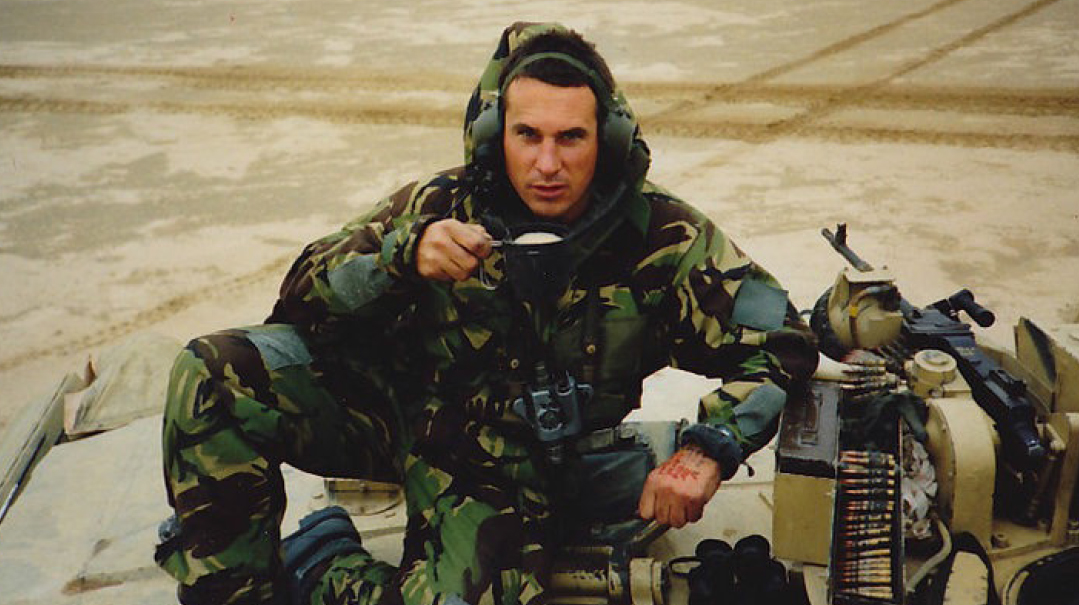
You served in Northern Ireland, which has been compared to Israel’s operations in the West Bank. What lessons did you draw from that theater for Israel to apply?
Northern Ireland wasn’t dissimilar to the West Bank in that it was effectively a policing operation, as opposed to Gaza, which is closer to our experience in Afghanistan and Iraq. The main difference I discovered was in the local mentality: In Northern Ireland, we focused heavily on a “hearts and minds,” kid-glove approach to win the trust of locals. In many ways that was successful, as can be seen today —there is a long-lasting peace agreement between the two sides.
But in dealing with a Middle East mentality, we discovered that restraint and care are construed as weakness. An example of that would be if an IDF soldier on duty at a checkpoint were less rigorous of his checks out of sympathy with the locals, he would be identified as a soft touch. When he was next on duty, that would invite a terrorist attack. In the Middle East, you need a tougher edge.
On the other side of the Middle East, President Biden said recently that he’s going to take all US forces out of Afghanistan. Having served in that theater, can you say if he is right to end the “Forever War”?
I think it’s a big mistake. Trump had a withdrawal plan, but it was conditional, and required things of the Taliban. Biden’s unconditional approach invites a Taliban takeover and likely civil war.
US foes such as China, Russia, and North Korea are circling like vultures, waiting to gain more influence when the US leaves. And it carries a big risk for US deterrence: leaving will be seen as American weakness.

Using both your experience in both the military and media fields, how would you sum up Israel’s fourth Gaza war?
I think the operation last Thursday, when the IDF massed armor and infantry on the Gaza border to convince Hamas to man their “Metro” tunnel system, will be studied in war colleges as a classic deception operation.
But on the media front, although I’ve been involved for years in numerous Israeli government and non-governmental efforts to improve Israel’s image, it’s an uphill struggle against influential media outlets working with an opposite agenda.
When the chips are down, it’s almost impossible to win the media narrative. Israel faces the greatest slur in world history. From my point of view, all that I can do is my very small part in trying to speak the truth.
(Originally featured in Mishpacha, Issue 862)
Oops! We could not locate your form.











